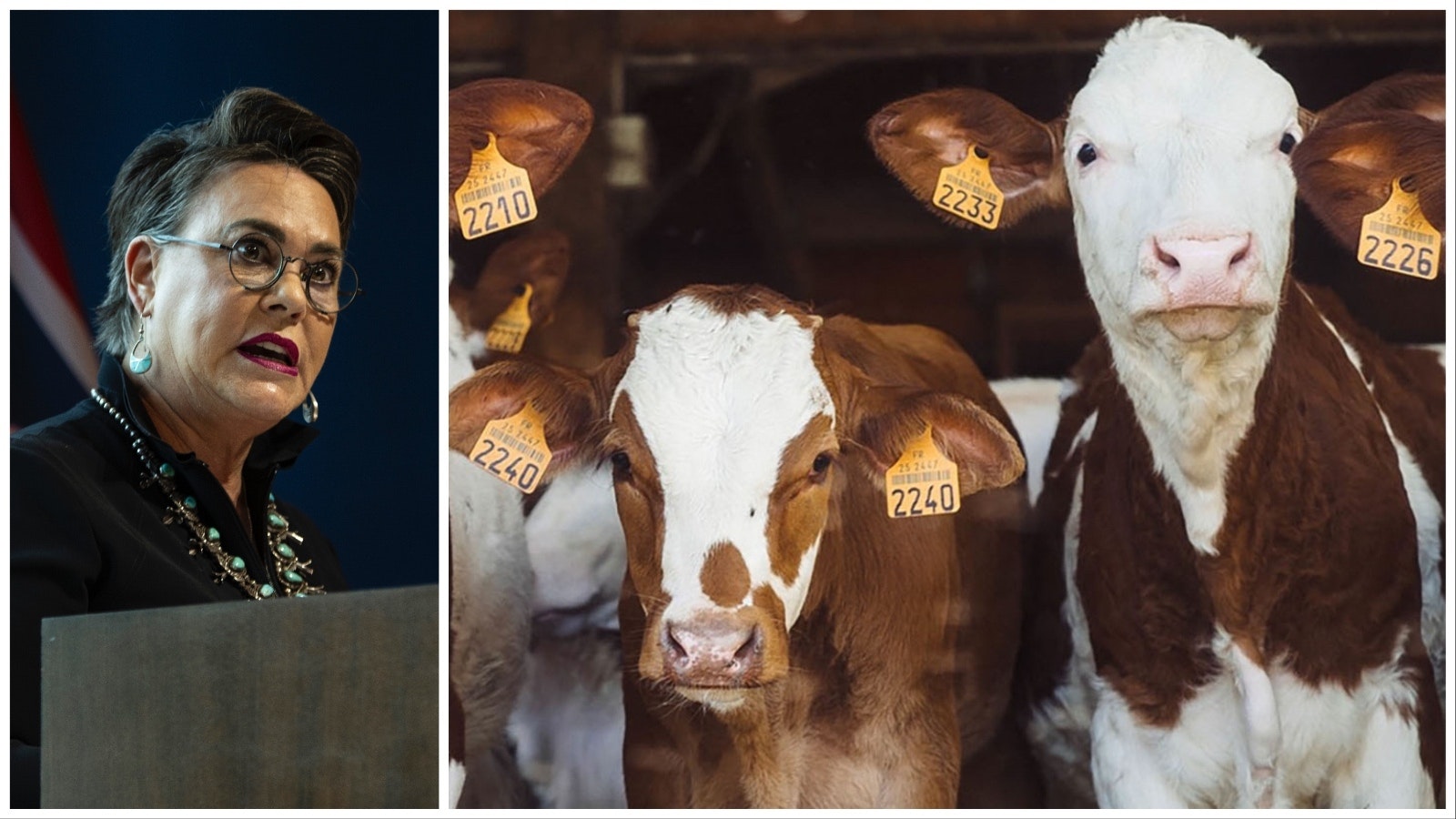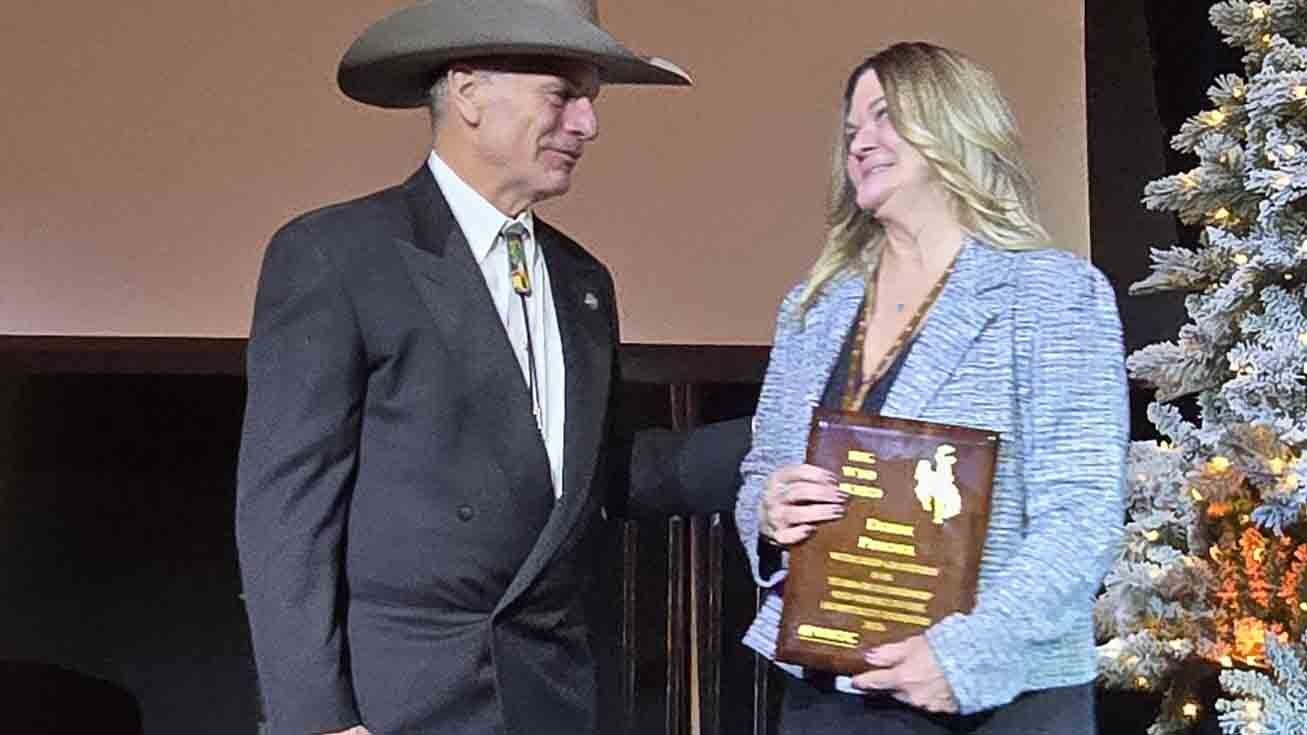Some Wyoming ranchers aren’t thrilled about a federally mandated switch to electronic ID tags for cattle, set to take effect Tuesday.
“They want to be able to control the ranchers a lot tighter than they can now,” Rep. Allen Slagle, R-Newcastle, told Cowboy State Daily on Friday.
A Matter Of Choice
Slagle, a rancher, sits on the Wyoming Legislature’s Agriculture, State and Public Lands & Water Resources Committee.
Earlier this week, the committee voted to forward a bill that would establish memorandums of understanding between Wyoming and some neighboring states. That would lay the ground rules for moving cattle between states.
But it’s unlikely to effectively counter the U.S. Department of Agriculture’s expected mandatory switchover to electronic ID tags for certain classes of cattle being moved across state lines.
And it’s the mandated part that Slagle and others say they resent, because there’s no choice in the matter.
“It’s like being told the only thing you can wear is cowboy boots, you can’t wear tennis shoes,” Slagle said.
“Both of them accomplish the same thing, keeping your feet protected. And it’s the same way with these tags and livestock disease tracing. Either the electronic tags or the old metal tags and brands can accomplish that,” he added.
Tracking Disease
The primary reason given for the switchover to electronic tags is that it will increase the speed and accuracy of tracing disease in cattle.
Brucellosis is of particular concern in Wyoming and around the region. That disease causes female cattle to spontaneously abort their calves. An outbreak in one state can shut down cattle trading with other states.
The switch to electronic tags is an upgrade in federal standards, Marty Zaluski, the head of regulatory affairs for GlobalVetLink, told Cowboy State Daily.
“The whole country is going to electronic tracing,” said Zaluski, the former Montana state veterinarian.
He recalled that while he was in that position in 2007, it took weeks to trace the origins of a brucellosis case.
“We have a risk in the Greater Yellowstone Area,” he said, and the new electronic tags will allow real-time tracking of possible infections.
“It’s really necessary, for risk assurance in GYA cattle,” Zaluski said.
Some opponents of the switch to electronic cattle ID tags say they worry about the cost. The USDA provided the soon-to-be phased out metal ID tags for free.
In preparation for the switch, the USDA has a stockpile of electronic ID tags, and those can also be distributed to ranchers for free, Zaluski said.
But if the electronic tags are over-used, the supply could be depleted, and USDA will start charging for the tags, he added.
Electronic ID tags will be required for three classes of cattle if they’re moved across state lines: Sexually intact animals, or breeding stock, over 18 months of age; dairy cattle, and rodeo or exhibition stock.

Hageman Blasts Electronic ID
Wyoming Republican Congresswoman Rep. Harriet Hagman – who comes from a ranching family – has been a vocal opponent of the switch to electronic tags.
She blasted it again in a statement issued on Friday. Hageman stated that she backs a lawsuit filed by the New Civil Liberties Alliance against the USDA, aiming to block the mandatory switchover to electronic tags.
“USDA simply does not have the authority to mandate the use of EID ear tags,” Hageman said in the statement.
“This is an unreasonably expensive, unfunded mandate that will lead to the elimination of small producers, vertical integration of our livestock and meat supply, put herds and ranches at risk through invasive Freedom of Information Act requests, and imposes an unbearable cost burden on all but the largest corporate producers,” she added.
Among other actions in the U.S. House, Hagman introduced a joint resolution to rescind Tuesday’s mandatory switch to electronic tags.
Invasion Of Privacy?
Even if the electronic ID tags are initially free, the costs of scanning devices and other equipment could add up quickly for ranchers, Sen. Cheri Steinmetz, R-Lingle, told Cowboy State Daily.
“It’s going to be very costly to producers, and sale barns and the entire system. So it will end up costing consumers as well,” said Steinmetz, who co-chairs the Legislature’s Agriculture committee.
Ranchers are also concerned about how electronic ID tags might affect their privacy, she added.
“There is just the loss of your freedom and control of your information. There are no protections over who will see your information and how it will be used,” Steinmetz said.
“In Europe, it’s been used to reduce cattle herds over climate change concerns,” she added.
Slagle said he has concerns about something similar happening here.
“If they can collect that information, then they can tell exactly how many cattle are in the United States,” he said.
Let The Private Sector Do It
Casper-area rancher Dennis Sun said he and many others aren’t opposed to the idea of electronic ID for cattle. He can see the value of streamlining disease tracking.
But the problem is, ranchers feel that it’s being forced on them by the federal government, said Sun, who is the publisher of the Wyoming Livestock Roundup.
It would work better to implement the change through the private sector, Sun said.
“I’m not sure the government should be involved. It should be private, a lot of people just don’t trust the government,” he said.
“It needs to be voluntary at first. And later on, if it really works and people really like it, then it can be mandated,” he said.
“When you start forcing something on people, they tend to fight back,” he added.
Mark Heinz can be reached at mark@cowboystatedaily.com.





